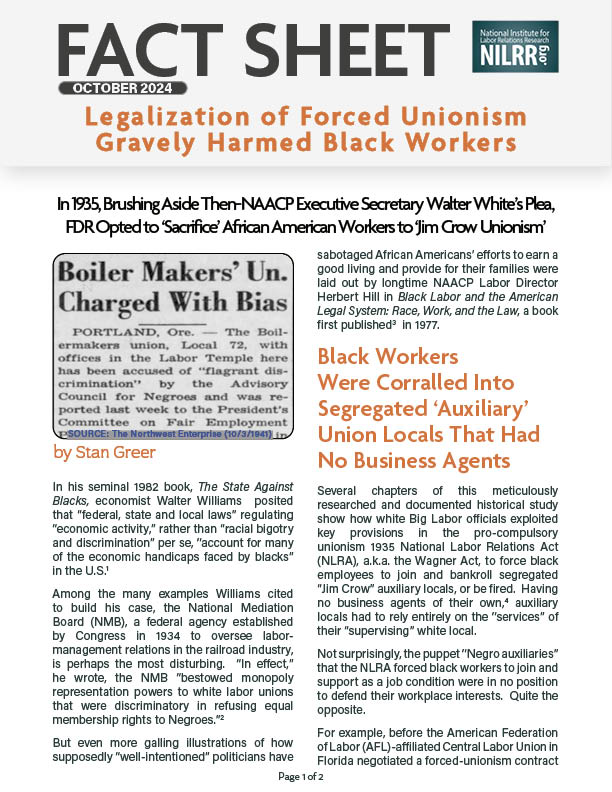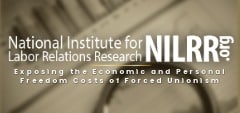In 1935, Brushing Aside Then-NAACP Executive Secretary Walter White’s Plea, FDR Opted to ‘Sacrifice’ African American Workers to ‘Jim Crow Unionism

Click here to download a pdf file.
In his seminal 1982 book, The State Against Blacks, economist Walter Williams posited that “federal, state and local laws” regulating “economic activity,” rather than “racial bigotry and discrimination” per se, “account for many of the economic handicaps faced by blacks” in the U.S.
Among the many examples Williams cited to build his case, the National Mediation Board (NMB), a federal agency established by Congress in 1934 to oversee labor-management relations in the railroad industry, is perhaps the most disturbing. “In effect,” he wrote, the NMB “bestowed monopoly representation powers to white labor unions that were discriminatory in refusing equal membership rights to Negroes.”
But even more galling illustrations of how supposedly “well-intentioned” politicians have sabotaged African Americans’ efforts to earn a good living and provide for their families were laid out by longtime NAACP Labor Director Herbert Hill in Black Labor and the American Legal System: Race, Work, and the Law, a book first published in 1977.
Black Workers Were Corralled into Segregated ‘Auxiliary’ Union Locals That Had No Business Agents
Several chapters of this meticulously researched and documented historical study show how white Big Labor officials exploited key provisions in the pro-compulsory unionism 1935 National Labor Relations Act (NLRA), a.k.a. the Wagner Act, to force black employees to join and bankroll segregated “Jim Crow” auxiliary locals, or be fired. Having no business agents of their own, auxiliary locals had to rely entirely on the “services” of their “supervising” white local.
Not surprisingly, the puppet “Negro auxiliaries” that the NLRA forced black workers to join and support as a job condition were in no position to defend their workplace interests. Quite the opposite.
For example, before the American Federation of Labor (AFL)-affiliated Central Labor Union in Florida negotiated a forced-unionism contract at the Tampa shipbuilding yards in 1940, more than 600 black workers had been employed there, “working at the various trades.” By 1941, reported Brotherhood of Sleeping Car Porters union President A. Philip Randolph to that year’s AFL convention, Boilermakers Union bosses had forced the dismissal of every single black worker from the Tampa shipyards.
Randolph observed: “The primary purpose of auxiliary unions is to give the impression that national unions are taking Negro workers in when they are actually keeping them out.”
Civil Rights Leader’s Warning: Under Wagner Act, Blacks Would Be ‘Absolutely Shut Out from Employment’
The reality that boilermakers and an array of other powerful Big Labor bosses would exploit their forced-unionism and monopoly-bargaining privileges under the NLRA to push black workers out of relatively desirable jobs and into low-paying jobs or unemployment lines surprised no one who had been paying attention.
In 1934, then-NAACP Assistant Secretary Roy Wilkins circulated a memo among his organization’s officers and staff warning that the then still-pending Wagner legislation “plainly empowers organized labor to exclude from employment in any industry those who do not belong to a union.”
Consequently, the vast majority of black employees who were then barred, under official or unofficial union policies, from joining the union overseeing their field of work stood to be “absolutely shut out of employment” if the bill became law.
Rather than call publicly for the defeat of the Wagner bill, NAACP Executive Secretary Walter White directly pleaded to President Franklin Delano Roosevelt that he commit himself to a veto the legislation unless an amendment was included denying all monopoly privileges to unions with racist restrictions on membership eligibility. Unfortunately, rather than buck the AFL brass, FDR ultimately opted to, in White’s words, “sacrifice” black workers “to Jim Crow unionism”!
As Chapters 5-9 of Race, Work and the Law show in detail, the spread of compulsory unionism in American workplaces that commenced with the 1937 Supreme Court decision upholding the NLRA and greatly accelerated just prior to and during World War II proved to be an enormous setback for black workers. Indeed, NLRA implementation evidently derailed a nascent recovery from the Great Depression and delayed a return to prosperity for American workers of all races for many years.
The documented harm inflicted on workers of all kinds, but especially on African American workers, by the legalization of forced unionism represents a systemic failure of the NLRA to further the economic goals proponents said it would achieve. Big Labor and its apologists have yet to reckon with this systemic failure. Until they do, it is difficult to understand why anyone would regard their current policy agenda as worthy of support.
Stan Greer is the National Institute for Labor Relations Research’s senior research associate. He may be reached by e-mail at stg@nrtw.org or by phone at 703-321-9606. Nothing here is to be construed as an attempt to aid or hinder the passage of any bill before Congress or any state legislature.

